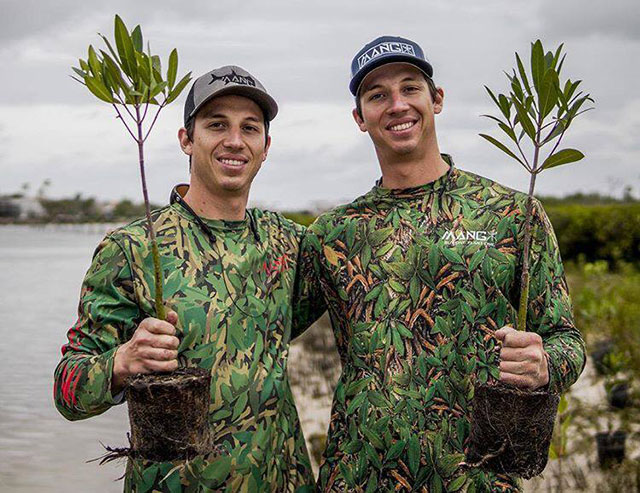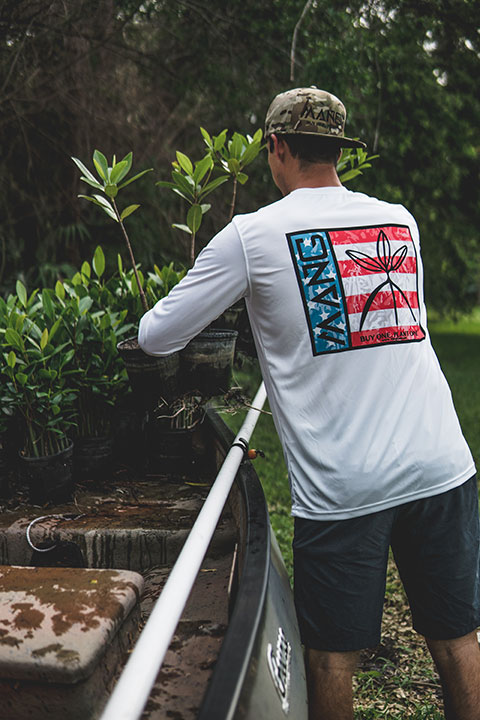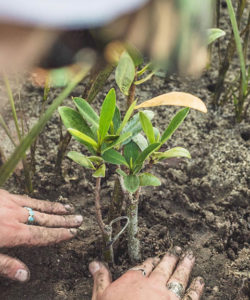Kyle Rossin wears his heart on his sleeve: Mangroves cover the arms and body of his moisture-wicking, ultraviolet-light-shielding polyester shirt.
Restoring these plants vital to Florida’s fragile coastal ecosystem is Rossin’s passion as well as his entrée into entrepreneurship. That camouflage-print shirt patterned after mangroves — “Mangroflage,” they call it — planted the seed for MANG gear, a line of fishing apparel that the 2015 FGCU grad and his brother, Keith, launched as a way to raise money to restore mangroves. For each product sold, the company plants a mangrove. So far, close to 60,000 have been placed in vulnerable areas of Florida, Madagascar, Honduras, Indonesia and Mozambique.

“Keith and I wouldn’t be in the apparel industry for any other reason,” Rossin said. “We had no desire to sell apparel. We thought we’d make a T-shirt, and it would be a one-off thing. The opportunity to plant mangroves and teach people about their importance to the environment is our real mission.”
Mangroves serve several critical functions in coastal ecosystems. They act as a buffer protecting land against storm surges and soil erosion; improve water quality by filtering pollutants and enhance air quality by sequestering carbon from the atmosphere; and provide habitat and food for marine life and shore birds.
MANG’s original “camo” pattern of green leaves sprouting from brown stems was inspired by the mangrove islands Rossin encountered as an environmental science major at the university’s Vester Marine & Environmental Science Research Field Station in Bonita Springs. Keith Rossin, his identical twin, also attended FGCU 2010-13 and creates some of their designs. Together, they employ about 10 people in their shipping center and work with numerous subcontractors to produce and market their products — yet another example of how Eagle entrepreneurs exert an economic impact in the world.
It was just an off-the-cuff comment about the potential of mangrove camo set off a ripple effect that grew into the hats, hoodies, accessories and art prints that MANG sells online and in select retail locations around South Florida. The small company’s “Buy One, Plant One” model mirrors well-established socially engaged businesses like TOMS shoes that prioritize giving back to society.

Growing up in West Palm Beach, the Rossin twins loved the outdoors, loved being on the water, loved fishing. Kyle Rossin was leaning toward a law career like his father and grandfather, but also felt drawn toward his mother’s environmental advocacy. FGCU’s sustainability initiatives and nature-based campus appealed to him, and dedicated faculty like Professor of Environmental Studies Win Everham helped him graft his passion onto an academic purpose.
“He had a special influence on me,” Rossin said. “He taught me all about sustainability and was good at connecting the dots with the real world. He had a hopeful outlook that influenced me.”
As with most educators, it’s gratifying for Everham to see students go on to apply the principles, skills and values they learn in school after they graduate into the real world.
“Some think that the economy and the environment are enemies,” Everham said. “At FGCU we try to teach that they are deeply linked, especially here in Southwest Florida. Good businesses understand this, and understand it’s not all about profit. It gives me great hope to see that our students are living the triple bottom line: planet, people, profit.”
That perspective probably had a lot to do with the Rossins’ resolve to start growing mangroves in their family’s backyard so they could be transplanted where they are needed. More than 10,000 propagules — seedlings, if you will — sit in salty water on a converted tennis court until they reach 2 to 3 feet high.
“They’re not difficult to grow, but it takes a long time,” Rossin said. “They grow about an inch a month.”

Working with local governments and Florida’s Department of Environmental Protection, the Rossins get permission to transplant the mangroves along coastal waterways where they’re needed and organize volunteers to help. Regions are chosen based on environmental needs as well as the economic and social impact mangrove planting provides for the local communities.
Those who purchase MANG gear are told the latitude and longitude where their mangrove is placed. Most of the plantings have been on the state’s east coast, but the company is working to expand in the near future to Southwest Florida as well as additional international locations where mangroves have declined. Losses are caused by factors such as coastal development, natural disasters, shrimp farming and harvesting for charcoal, Rossin said.
To enlighten more people about the importance of mangroves, MANG conducts education days at elementary, middle and high schools and also brings groups to the mangrove nursery for hands-on experience and educational seminars.
And, of course, the company’s clothing for a cause helps spread the word – and not just about mangroves. The company spotlights a monthly cause on its website with custom apparel designs to raise proceeds for nonprofit environmental efforts such as shark conservation.
“MANG and other companies like ours can influence the future of the environment,” Rossin says. “We’re doing it one mangrove at a time.”
BAHAMAS RELIEF
MANG has a created a special collection of shirts, hoodies and stickers to raise money for Hurricane Dorian relief efforts. All proceeds will go to the Bahamas to revitalize communities and bring back mangroves to their shorelines.
- Where to buy MANG gear in Southwest Florida
- Read about FGCU’s Dorian relief efforts